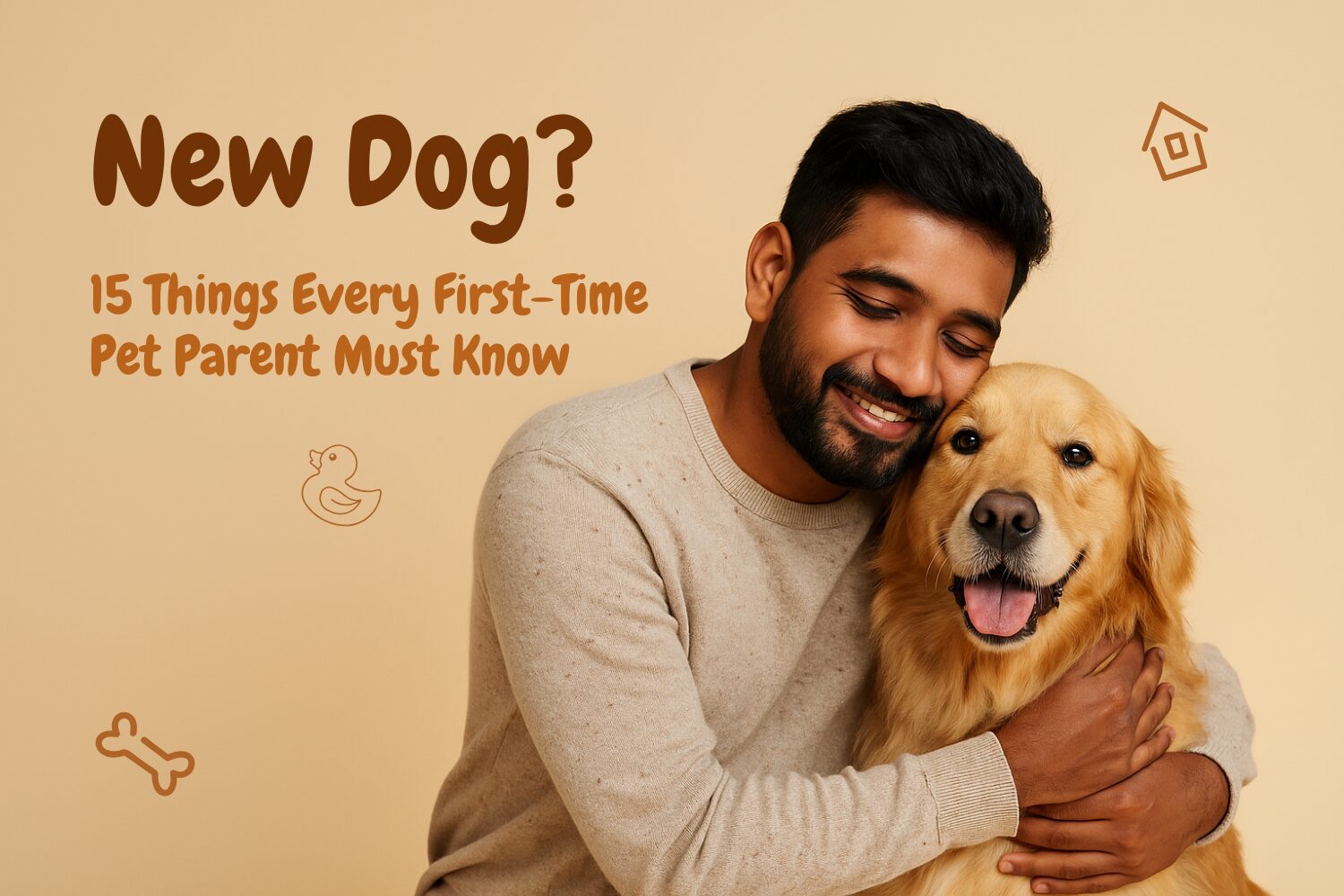Bringing home a new dog is exciting, but it comes with responsibility. If you’re a first-time dog parent, it’s normal to feel unsure where to begin.
Dogs need more than food and toys. They rely on structure, care, and emotional connection to thrive in their new home. Without the proper routine, training, and support, both pet and parent can become stressed.
This guide gives you a clear, practical list of 15 things every first-time dog owner in India should know, from daily needs and nutrition to bonding and health.
1. Set a Routine From Day One
Dogs love structure. Decide on fixed times for:
- Feeding
- Walks
- Potty breaks
- Play and rest
Sticking to a schedule builds trust and makes house training easier.
2. Choose the Right Food for Their Age
Puppies need growth-supportive food, while adult dogs need maintenance formulas. Avoid feeding:
- Spicy leftovers
- Sugary foods
- Milk (many dogs are lactose-intolerant)
Start with a quality dog food brand or a home-cooked diet recommended by your vet.
3. Start Toilet Training Immediately
Use verbal cues and reward-based training to guide toilet habits. Take your dog out:
- First thing in the morning
- After meals
- Before bedtime
Be patient – consistency is key.
4. Vaccinations Are Non-Negotiable
Your dog needs timely vaccines to protect against:
- Rabies
- Distemper
- Parvovirus
- Leptospirosis
- Canine Hepatitis
Follow your vet’s vaccination schedule, critical in India, where street dog interactions are everyday.
5. Deworm Regularly
Puppies often have worms. Deworming every 15 days initially, then monthly, is essential for good digestion and growth. Your vet will prescribe based on age and weight.
6. Get Basic Supplies Before the Dog Arrives
You’ll need:
- Food and water bowls
- Leash and collar
- Crate or bedding
- Puppy shampoo
- Poop bags
- ID tag with phone number
Preparing early helps avoid last-minute chaos.
7. Create a Safe Space at Home
Set up a quiet corner with your dog’s bed, food, and toys. Avoid allowing access to all rooms initially — it can be overwhelming.
8. Begin Socialization Early
Expose your dog to:
- Other people
- Sounds (traffic, doorbells)
- Other vaccinated dogs
This helps prevent aggression, fear, or anxiety later in life.
9. Avoid Overfeeding Treats
Treats are great for training, but too many can lead to obesity. Choose healthy treats and keep them under 10% of daily calories.
10. Use Gentle, Consistent Training
Avoid punishment. Positive reinforcement (rewards, praise) works best. Teach basics like:
- Sit
- Stay
- Come
- No
Training builds communication and improves safety.
11. Start Grooming Early
Even short-haired dogs need:
- Regular brushing
- Nail trimming
- Ear cleaning
Start these habits young to make them stress-free in the future.
12. Watch for Signs of Stress or Illness
Common red flags:
- Vomiting or diarrhea
- Lack of appetite
- Excessive scratching
- Sudden aggression or fear
- Lethargy
Visit your vet if symptoms last more than 24–48 hours.
13. Support Gut and Immune Health
Puppies and new rescues often face digestive issues due to stress, food change, or previous health issues.
history.
Support their system with supplements like:
- Probiotics – for better stool and gut balance
- Digestive enzymes – for food absorption
- Nucleotides – for faster immune recovery
Neobiotic DFM offers a balanced blend of these and is safe for puppies and adult dogs.
Also Read: Top Signs Your Pet Has a Weak Immune System
14. Plan Walks, Not Just Playtime
Mental stimulation and leash training are just as important as play. Daily walks:
- Improve focus and discipline
- Prevent destructive behavior
- Support digestion and sleep.
Start slow and use a harness for safety.
Also Read: Daily Pet Care Routine
15. Bonding Takes Time
Don’t expect instant love. It takes weeks to months for dogs to trust and settle fully.
Spend calm time together, avoid loud corrections, and give them space to decompress.
The bond you build now sets the tone for a lifetime.
Final Thought
The first few weeks with your new dog shape your bond for life. With structure, love, health support, and consistency, even first-time pet parents can raise happy, confident dogs.
Explore more beginner-friendly dog care tips on the GenextPet Blog and start your journey the right way.
faqs
What should I do first after bringing my dog home?
Please set up a safe space, introduce a routine, offer water and a light meal, and let them rest. Avoid overwhelming them on day one.
How often should a new dog eat?
Puppies eat 3–4 times a day. Adult dogs typically eat twice daily. Feed at fixed times, not free-feeding.
When should I start training my dog?
Right away. Even 8-week-old puppies can learn basic cues through positive reinforcement.
What supplements are suitable for new dogs?
Probiotics, digestive enzymes, and immune boosters help digestion, especially after food changes or deworming.
Is it okay to adopt a dog if I live in an apartment?
Yes. Many breeds like Beagles, Shih Tzus, or Indian Pariahs do well in apartments if exercised regularly.
About Author
Dr. Kevin Modi
Dr. Kevin Modi is a trusted voice in the Indian pet care space, with years of hands-on experience in pet wellness, gut health, and natural supplements. At GenextPet, he guides product formulation and ensures content accuracy, drawing from real-world insights and the latest research. His goal? To simplify pet health for every dog and cat parent.


